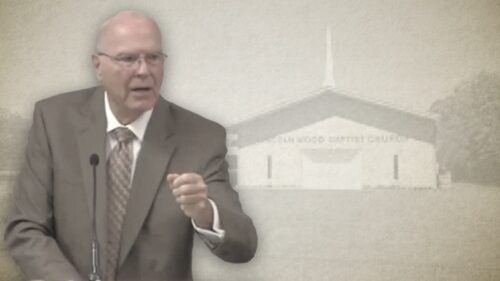Jared Smith
Jared Smith served twenty years as pastor of a Strict and Particular Baptist church in Kensington (London, England). He now serves as an Evangelist in the Philippines, preaching the gospel, organizing churches and training gospel preachers.
Jared Smith's Online Worship Services
Jared Smith's Sermons
Jared Smith on the Gospel Message
Jared Smith on the Biblical Covenants
Jared Smith on the Gospel Law
Jared Smith on Bible Doctrine
Jared Smith on Bible Reading
Jared Smith's Hymn Studies
Jared Smith on Eldership
Jared Smith's Studies In Genesis
Jared Smith's Studies in Romans
Jared Smith on Various Issues
Jared Smith, Covenant Baptist Church, Philippines
Jared Smith's Maternal Ancestry (Complete)
-
The Resurrection Of The Lord Jesus Christ
After three days and three nights, the Lord Jesus Christ rose from the dead. Henceforth, on the first day of the week we commemorate the resurrection of Christ in full assurance of our everlasting salvation.
-
The Death Of The Lord Jesus Christ
There is irrefutable evidence that the Lord Jesus Christ was crucified on the Wednesday, rather than the Friday. We therefore commemorate His death and reflect upon the meaning of redeeming grace.
-
AHB Worship Services, Jared Smith's Online Worship Services, Jared Smith's Sermons, Jared Smith's Studies In Genesis
The Administration Of God’s Grace Under Two Perpetual Covenants
The masterplan of God for the ages may be summarized as the administration of His grace to the members of the human race. There is a common grace unto creation administered by God to the unregenerate sinners who are subject to Him under the authority of the covenant of works. There is a special grace unto salvation administered by God to the regenerate sinners who are subject to Him under the authority of the covenant of grace. The entire human race is divided between these groups—the unregenerate and the regenerate; and they are under one of two covenants—works and grace. The names and narratives recorded in Genesis 4 fit within this context.
-
AHB Worship Services, Jared Smith's Online Worship Services, Jared Smith's Sermons, Jared Smith's Studies In Genesis
Baptism And The Covenants
Those who practice infant baptism, within the tradition of Reformed Theology, do so upon the basis of their covenantal framework. However, there is more than one way to understand the arrangement of the biblical covenants. In this study, we examine several different arrangements, some of which support the biblical teaching of believers baptism.
-
AHB Worship Services, Jared Smith's Online Worship Services, Jared Smith's Sermons, Jared Smith's Studies In Genesis
The Origin Of False Religion And The Revelation Of True Religion
Whereas the second chapter of Genesis describes the garden of Eden before sin entered into the world, the third chapter marks out the events leading to sin entering the world. There are three parts to the chapter: (1-6) The entrance of sin into the world—of the angelic hosts and the human race; (7-13) The origin of false religion—unregenerate sinners are under the authority of the covenant of works, subject to its curse, as they are conceived in sin and shaped in iniquity. False religion is the attempt of sinners to make themselves right with God according to the terms of the Covenant of Works. Hiding one's sins, hiding from the presence of God and self-justification/righteousness are indicators of false religion. (14-24) The Revelation of True…
-
43 Bible Doctrine – The ‘Introduction’ To Gill’s Body Of Divinity
I would like to welcome you back to another study in Bible Doctrine. In our previous study, I aligned the chapters of John Gill’s ‘Body of Doctrinal and Practical Divinity’ with the Framework of Sovereign Grace. I will be using this diagram as the key, or map, to navigate us through the teachings of Gill. For this study, I wish to look at Gill’s Introduction to systematic theology. He begins his Introduction by stating the reason for publishing a ‘Body of Doctrinal and Practical Divinity’. It was after completing his commentary on the Old and New Testament Scriptures, he chose to enter upon an exposition of systematic theology, which he delivered week by week, in the course of his pastoral ministry at Carter Lane Chapel.…





